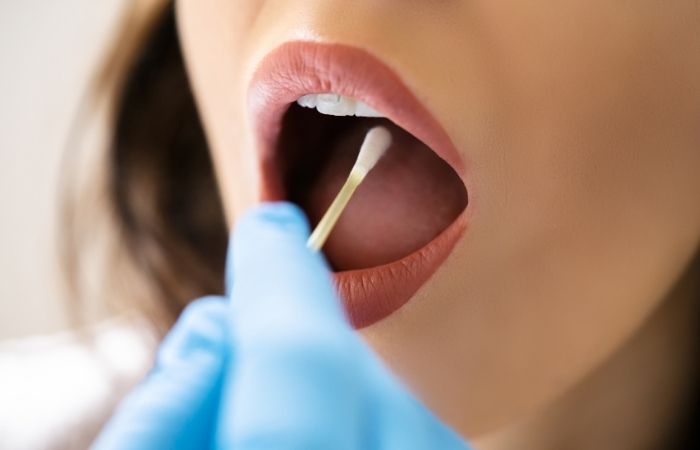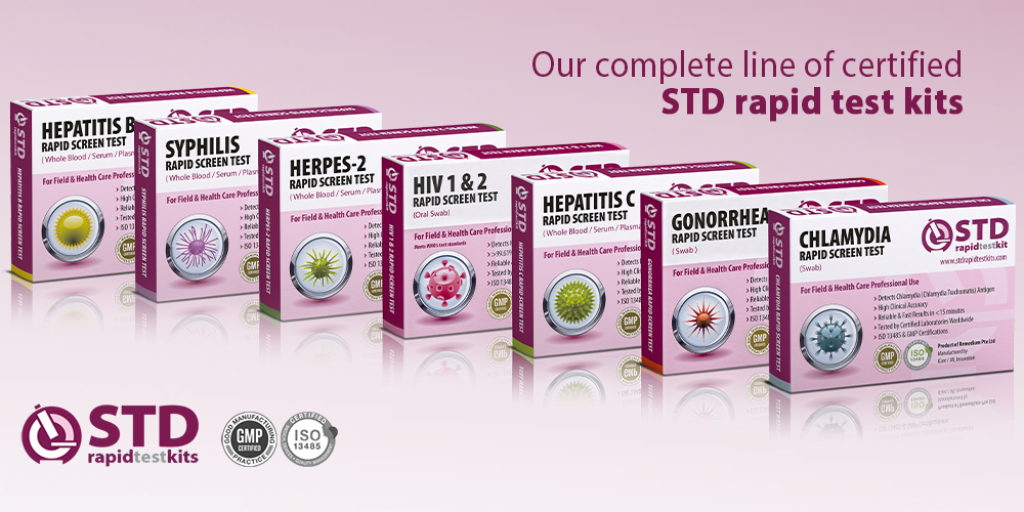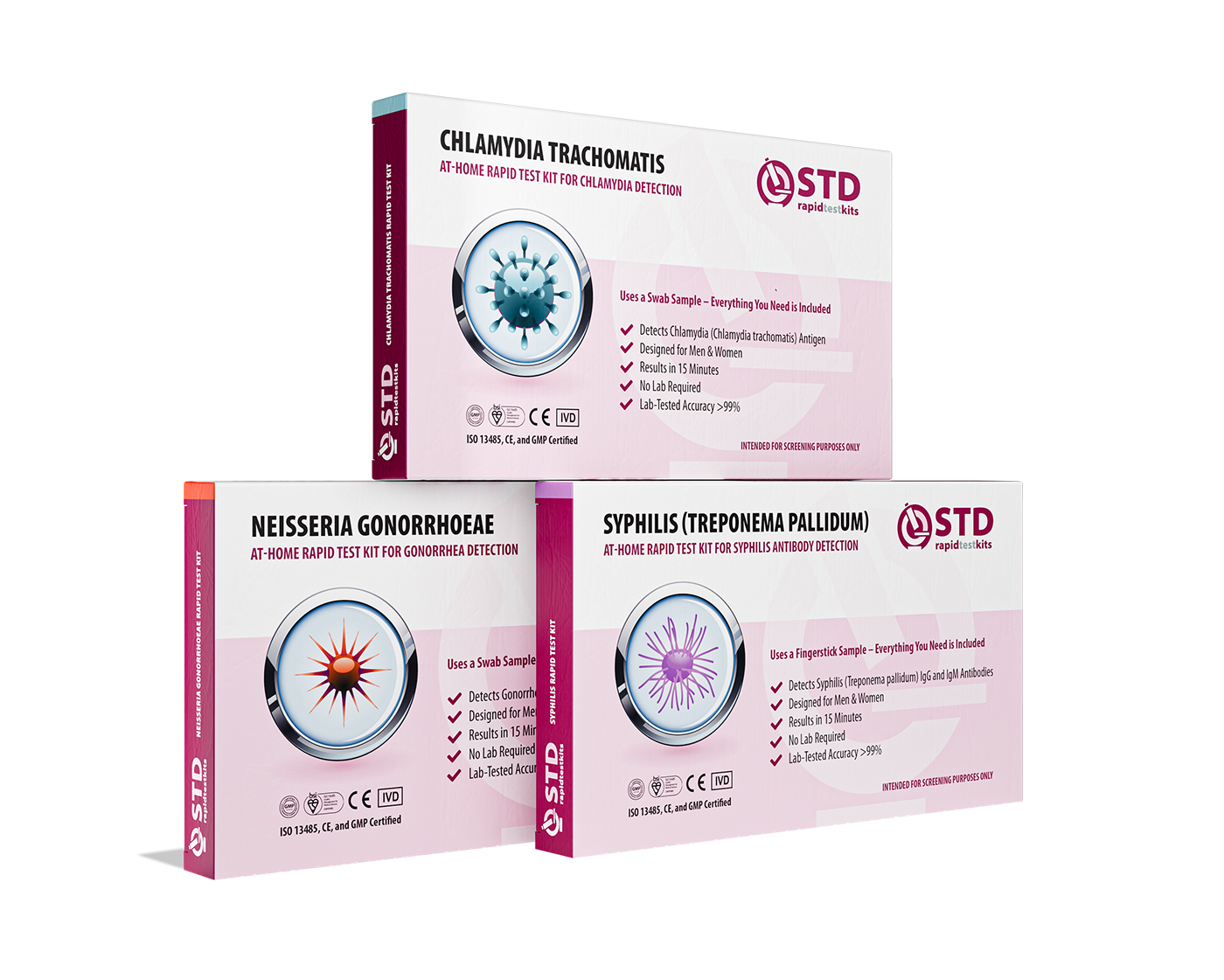Quick Answer: STD sore throat symptoms can mimic strep or tonsillitis, including redness, swelling, and white spots on the tonsils. Testing is the only way to know for sure.
“I Thought It Was Just Strep”
David, 32, didn’t think twice when he felt that familiar scratch in his throat. He’d had strep a few times in his life, so when his tonsils flared up with white patches, he booked a quick clinic visit. A strep swab came back negative, but the doctor noticed something unusual, tiny blisters and inflamed tissue at the back of his mouth. A throat swab for STDs revealed gonorrhea.
“I was floored,” David admitted. “I’d only been with one partner recently, and we didn’t even have intercourse, just oral.”
David’s story is far from rare. Many oral STDs fly under the radar because their symptoms mimic common infections. By the time people realize it’s not going away, the infection may have already been passed to others.

People are also reading: Getting Tested on Tribal Land: What Options Exist, and What Still Doesn’t
This Isn’t Just Strep, And Here’s Why
While strep throat is caused by bacteria you pick up from airborne droplets, oral STDs like gonorrhea, chlamydia, herpes, and syphilis are spread through sexual contact, often from mouth-to-genital or mouth-to-mouth exposure. The tricky part? Their symptoms overlap heavily with non-sexually transmitted throat infections.
- Risk: Unprotected oral sex with an infected partner
- Symptom Overlap: Redness, pain when swallowing, pus-like patches
- Hidden Danger: Some cases cause no symptoms at all
This means you could be carrying, and spreading, an STD without knowing it. It also means a sore throat after a sexual encounter shouldn’t be brushed off without testing.
What STD Symptoms Look Like in the Throat
Visual clues can help guide you, but they’re not a substitute for medical testing. Here’s what different oral STDs can look and feel like:
- Gonorrhea: Red, swollen tonsils with white or yellow spots; persistent soreness
- Chlamydia: Mild redness and irritation, often without visible patches
- Herpes: Small fluid-filled blisters or ulcers, sometimes mistaken for canker sores
- Syphilis: Painless sore (chancre) inside the mouth or on the lips
Because these signs can mimic strep, allergies, or even acid reflux, many people never think “STD” until a test proves otherwise.
Why Doctors Often Miss Oral STDs
Most primary care providers and urgent care clinics default to testing for strep, mono, or common viruses when someone presents with a sore throat. Unless you disclose recent oral sex or ask for STD testing specifically, oral swabs for gonorrhea or chlamydia may never be performed.In addition to increasing the chance of infecting partners, this can postpone treatment.
Oral gonorrhea can spread through kissing or sexual contact, even though it often shows no symptoms at all, according to the CDC.
Check Your STD Status in Minutes
Test at Home with RemediumGenital & Oral Herpes Test Kit

 For Men & Women
For Men & Women Results in Minutes
Results in Minutes No Lab Needed
No Lab Needed Private & Discreet
Private & DiscreetOrder Now $75.00 $98.00
For all 2 tests
Testing: The Only Way to Know for Sure
Here’s the truth: you cannot tell by sight or feel whether a sore throat is from an STD or something else. Even experienced doctors get it wrong without lab results. The only reliable way to confirm is through a throat swab STD test. These tests identify precisely what is present by searching for genetic material from bacteria or viruses.
You can request these swabs at a sexual health clinic, some urgent care centers, or use an FDA-approved at-home combo test kit that includes oral specimen collection. Home kits are discreet, accurate, and ideal for people who feel uncomfortable discussing their sex life with a stranger in a clinic.
Pro tip: When booking a test, specify that you need oral/throat STD testing, not just genital.
What Takes Place If You Don't Treat It?
If symptoms go away, untreated chlamydia or gonorrhea in the throat may not seem serious, but the infection can spread and persist. In particular, gonorrhea bacteria are becoming resistant to antibiotics, which makes cases that are left untreated more difficult to treat in the future.
- Health Risks: May cause systemic illness and spread to other body parts.
- Risk of Transmission: Transmitted during kissing or oral intercourse
- Resistance Risk: A factor in strains of "super gonorrhea"
The infection might still be active even after you feel better. For this reason, post-treatment follow-up testing is essential.
Treatment Options: Fast and Effective
The good news? Most oral STDs are treatable. Gonorrhea and chlamydia typically require prescription antibiotics, while herpes and syphilis have their own targeted medications. Your provider will match treatment to the infection identified in your test.
For bacterial infections like gonorrhea and chlamydia, you’ll usually get:
- Gonorrhea: A single intramuscular injection plus oral antibiotics
- Chlamydia: A short course of oral antibiotics
Viral infections like herpes don’t go away, but antiviral medication can reduce outbreaks and make them less contagious.

People are also reading: What Men Need to Know About HPV, And Why Most Never Get Tested
How to Protect Yourself from Oral STDs
You don’t have to give up oral sex to avoid oral STDs. Safer sex practices drastically reduce your risk:
- Use barriers: Condoms or dental dams during oral sex
- Limit partners: Reduce exposure risk by being selective
- Test regularly: Especially if you have multiple partners or new partners
- Communicate openly: Talk about testing history before sexual contact
And yes, kissing can spread some infections like herpes and gonorrhea. If your partner has mouth sores or a sore throat, it’s best to wait until they’re cleared.
Why “Just Waiting” Is a Bad Idea
People often wait to see if a sore throat clears on its own, hoping it’s “just strep.” But that waiting period can mean unknowingly passing the infection to others. It also allows bacterial infections to spread deeper, making them harder to treat. With at-home tests available, there’s no reason to live with that uncertainty.
Get answers right away with a private at-home sexually transmitted disease test that uses throat swabs.
Check Your STD Status in Minutes
Test at Home with Remedium3-in-1 STD Test Kit

 For Men & Women
For Men & Women Results in Minutes
Results in Minutes No Lab Needed
No Lab Needed Private & Discreet
Private & DiscreetOrder Now $69.00 $147.00
For all 3 tests
High-Risk Situations That Deserve Extra Attention
Certain sexual scenarios make throat exposure to STDs more likely. You should consider testing if you’ve experienced any of these in the past few weeks:
- Unprotected oral sex with a new or unknown-status partner
- Kissing someone with visible mouth sores or known oral herpes
- Participating in group sexual activity where barrier use is inconsistent
- Being with a partner who has had recent STD exposure or symptoms
These are not judgments, they’re practical risk factors that help guide whether testing is warranted.
The Emotional Aspect: Fear, Shame, and Taking Charge
It can cause anxiety, embarrassment, and even rage to learn that your sore throat may be an STD. The truth is that your body is just responding to an infection. That's all. It doesn't define your character, decisions, or value.
“I felt dirty at first,” David told me, “but my doctor reminded me: you can get this from one encounter. It’s not about being ‘reckless’, it’s about being human.”
Shame often keeps people from seeking help, but that delay can harm both you and your partners. The faster you test, the faster you can treat, and the faster you can move forward without uncertainty weighing on you.
How to Talk to a Partner About Possible Exposure
There’s no perfect line for telling someone you might have exposed them to an STD. No script makes it easy. But it doesn’t have to be a disaster. These conversations are hard because they matter. Because trust and intimacy are involved. Because even saying the words “I tested positive” can feel like you're pulling the pin on a grenade. But here's the truth: saying something is always better than silence.
Start with honesty. Keep it short and grounded. “Hey, I just got some test results back. I tested positive for an STD from the test I took on [date]. I wanted to tell you as soon as I found out.” That’s not drama. That’s care. You’re not accusing. You’re informing. You're giving them the gift of clarity, whether or not they’re ready to receive it.
If they react with panic, fear, or even anger—remember, that’s not necessarily about you. It’s about the stigma swirling around their own shame or confusion. You can stay calm. You can keep the door open. You can say, “I don’t know how long I’ve had it,” or “You might not have symptoms, but testing would be smart either way.” That kind of tone doesn’t just pass along facts—it models compassion.
In one real moment, you might text them the link to an at-home test kit. Not to push them. Not to scare them. But to say, “Here’s something I found. It’s discreet. If you want it.” Sometimes showing someone a next step is more powerful than any apology. It gives them a way to act, not just react.
And if you’re nervous, that’s normal. You’re not weak. You’re not broken. You’re doing something most people avoid. That’s strength. That’s integrity. That’s love in real time—even if the relationship’s already over.
So no, it’s not an easy conversation. But it can be a loving one. And when it’s done right, it can actually bring people closer. Not because the news is easy—but because the honesty is real.

People are also reading: Sexual Health After Coming Out: A Toolkit for LGBTQ+ Teens Without Family Support
The Consequences of Ignoring an Oral STD
Ignoring a sore throat that is caused by an STD can have long-term effects, even though it's simple to brush it off as "no big deal." Infections like chlamydia and gonorrhea can linger in the throat for months, even if there are no serious symptoms. Through subsequent sexual contact, these bacteria can spread to other areas of the body, including the genitalia.
To make matters worse, untreated infections can lead to antibiotic resistance. The CDC claims that some gonorrhea strains that are becoming more difficult to treat are evolving as a result of oral infections. Standard treatments may no longer be effective once resistance develops, leaving fewer and less effective options.
FAQs
1. Can kissing cause gonorrhea?
Yes, and not just in theory. Deep kissing, especially with tongue, can transmit oral gonorrhea, though it’s less common than through oral sex. If one person has cuts in their mouth, bleeding gums, or even a minor canker sore, the bacteria has a door. So that steamy makeout session? It's probably safe, but it’s not completely risk-free. Welcome to the gray area of modern intimacy.
2. Is it possible for strep throat and an STD to happen at the same time?
Totally. In fact, that overlap can mess with your diagnosis. Picture this: your throat’s on fire, your doctor swabs for strep, it comes back positive, but you also had oral sex last weekend. If they don’t test for gonorrhea or throat chlamydia, they might miss the second culprit. Double infections happen. It’s not rare. It just requires someone curious enough to test for more than strep.
3. Is strep more painful than an STD-related sore throat?
Not always. Some oral STDs don’t hurt at all. You might feel a slight tickle, a mild dryness, or nothing. And then there’s strep, sharp, scratchy, unmistakable. But pain varies wildly from person to person. Some folks feel fine with raging infections. Others feel wrecked by the smallest irritation. Don't wait for pain to be your only signal. If you had oral sex recently and your throat feels weird, just test.
4. Can taking antibiotics for strep cure an STD?
Tempting idea, but nope. Most strep is treated with penicillin or amoxicillin, neither of which reliably clears gonorrhea or throat chlamydia. Those bugs need different meds, and some strains are becoming antibiotic-resistant. So no, that leftover strep prescription in your cabinet isn’t a DIY fix. Treating one infection won’t magically erase another. If you think you’ve been exposed, test specifically for STDs. Don’t gamble with your throat.
5. Can oral herpes cause a sore throat?
Oh yeah. Especially during a first outbreak. You might get blisters, swollen lymph nodes, low fever, and a sore throat that makes swallowing feel like sandpaper. It’s called herpes pharyngitis, and it’s more common than people think, especially if you caught HSV-1 from oral sex or kissing. Once the virus settles in, later outbreaks are usually milder. But that first one can be intense.
6. Can you get an oral STD without kissing?
Yep. It’s not about kissing, it’s about contact. Mouth-to-genital, mouth-to-anus, even shared sex toys can pass STDs like gonorrhea, chlamydia, herpes, and HPV. So if you’re going down on someone, licking toys, or exploring with tongues, yes, exposure can happen. Kissing is just one route. The mouth is a busy place.
7. How long does it take for oral STD symptoms to show up?
Most start showing signs within a few days to two weeks. That could mean a sore throat, swollen tonsils, white patches, or just a dry tickle you can’t explain. But here’s the frustrating part, many people have no symptoms at all. You can feel totally fine and still be contagious. That’s why regular testing matters, not just symptom-chasing.
8. Are at-home throat STD tests reliable?
Yes, when used correctly and bought from trusted sources STD test kits can be tremendously reliable.
9. Can HPV really cause throat cancer?
It can. Certain high-risk strains of HPV have been linked to oropharyngeal cancers. The risk is higher for people who’ve had multiple oral sex partners or who weren’t vaccinated. Most HPV infections clear on their own. But in some cases, they linger quietly for years and lead to bigger problems later. Vaccination, regular dental and medical checkups, and screening if you notice anything weird in your throat, that’s the smart move.
10. Can condoms prevent oral STDs?
They help a lot, but they’re not perfect. Condoms and dental dams block fluids, which lowers risk for STDs like chlamydia and gonorrhea. But for skin-to-skin infections like herpes or HPV, the virus can still spread from uncovered areas, like the base of the penis or nearby skin. That doesn’t mean don’t use them. It means add other tools: talk, test, use protection, rinse toys, and respect your body's signals. It’s about stacking your safety, not chasing perfection.
Check Your STD Status in Minutes
Test at Home with Remedium7-in-1 STD Test Kit

 For Men & Women
For Men & Women Results in Minutes
Results in Minutes No Lab Needed
No Lab Needed Private & Discreet
Private & DiscreetOrder Now $129.00 $343.00
For all 7 tests
You Deserve Answers, Not Assumptions
If your sore throat isn’t getting better, don’t let uncertainty take over. The truth is, you can’t tell by looking whether it’s strep, tonsillitis, or an STD. But you can find out quickly, discreetly, and without judgment.
Don’t wait and wonder, get the clarity you deserve. This at-home combo test kit checks for the most common STDs discreetly and quickly, including those that affect the throat.
Sources
World Health Organization – STIs
Mayo Clinic – Sexually Transmitted Diseases










